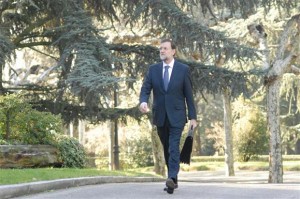
“My intention is not to raise taxes.” It’s a line that Mariano Rajoy’s critics will repeat back at him for years to come. Much like George H. W. Bush’s infamous “Read my lips: no new taxes”, Rajoy’s pledge, made on December 19, during the debate ahead of his investiture as Spain’s new prime minister, has proved to be empty.
Unlike Bush, Rajoy has not resisted or dragged his feet in performing a spectacular U-turn on this issue. Eleven days after saying he wouldn’t raise taxes, his deputy prime minister, Soraya Sáenz de Santamaría, announced tax increases that will bring in an extra €6 billion this year.
As Spaniards digest the implications of the new Popular Party government’s austerity drive, which also includes €9 billion in cuts and freezes, they are also contemplating the confusion surrounding the public accounts in recent weeks. It’s a confusion that reflects badly on the political transition from the outgoing Socialist administration to the Rajoy government and it augers badly for the coming legislature.
The outgoing Socialist government had been working, or at least claiming to work, on the assumption that the 2011 public deficit would comply with the EU-set target of 6 percent of GDP. But on announcing the Popular Party government’s first cuts, on December 30, Santamaría revealed that the true figure was 8 percent, meaning a further shortfall of €20 billion.
This, she added, was “a much higher figure than communicated and promised by the previous government.” Her fellow minister Cristóbal Montoro has been even more forthright in recent days in suggesting the Socialists lied about the deficit – to the public and the incoming government.
In addition, the new government has revealed a previously unannounced deficit in the social security system, putting further pressure on the public accounts.
The argument will run and run over whose fault these black holes really are (although Rajoy himself has acknowledged that regional and municipal administrations, most of them run by his Popular Party, have plenty to answer for), but the question remains: why did Rajoy make a promise he would immediately break?
The government insists that when Rajoy gave the speech to Congress in which he made the famous pledge he was still unaware of the scale of the deficit. And yet, reports that the deficit could be as high as 8 percent by the end of the year had been circulating for months. According to El Mundo’s Carlos Segovia, the government’s version of events doesn’t add up. He says that straight after the November 20 election, Santamaría herself commissioned senior PP economists to prepare a list of possible measures to cover such a large financing gap – and raising both income tax (which Rajoy has done) and VAT (which he hasn’t, at least yet) were among them.
Rajoy’s language on making the promise itself is hardly overwhelming: “My intention is not to raise taxes”. This suggests that perhaps the tax hike wasn’t such a bombshell for him. Using the they-told-us-it-was-only-6-percent line is certainly convenient when it comes to delivering a €15-billion austerity plan.
The prime minister has always been coy when it comes to facing the press, but when he delegated the announcement of his first measures to his deputy, it took the phrase “camera-shy” to an extreme. Presumably, by not making the announcement himself he felt he would somehow distance himself from the tax U-turn. Instead, he appeared reluctant to look voters in the eye and give them bad news, an error he seems to have sought to remedy by giving EFE a filmed interview this week.
An opaque approach
Recent months have done little for the credibility of Rajoy and Spain’s political class. The new prime minister sidestepped detail and hardly made any promises during the election campaign, despite the drastic state of the economy he would inherit. And yet, on taking office he has broken one of his only pledges. The near-obsessive secrecy with which Rajoy has gone about preparing his austerity measures and ministerial appointments has hardly served to alter this image of opacity.
Meanwhile, the Socialist opposition, mired in their own process of reinvention, must take at least some blame for insisting in public that the deficit they had been managing was on target, when clearly it wasn’t, to the tune of €20 billion.
Throughout this economic crisis, the two main parties’ inability to reach consensus for the good of the country has been all too clear. And now, just days into a new four-year legislature, neither shows signs of putting the national interest ahead of political points-scoring. Rajoy’s policies may impress Brussels, but his country’s politics won’t.
This will be a year of reforms in Spain, from the labour market to the financial sector. But what also needs to be overhauled is the disdain and lack of sincerity with which the country’s politicians treat the electorate.
Leave a Reply
You must be logged in to post a comment.